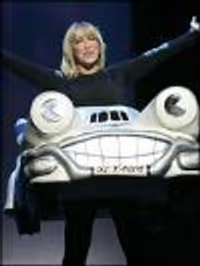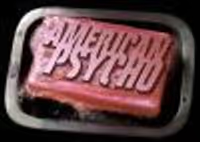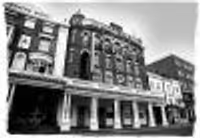The Last Ship previews
evic
Broadway Star Joined: 3/5/04
#50The Last Ship previews
Posted: 9/30/14 at 1:18pmThe enthusiastic response from people seeing a first preview is because the house is usually filled with friends and supporters. The real test comes when poeple not connected to the show see it. Many musicals that had great first preview reactions closed after 1 performance. That said, it is set in Ireland so it has to be grim and bleak. Is there a scene at a wake or funeral?-that is a must for an Irisah themed show. And lots of drinking and fighting I suppose as well.
#51The Last Ship previews
Posted: 9/30/14 at 1:21pm
Hmm...I guess I have a different definition of dreary than some other people.
For example, I review movies for a blog, and when I call a film "dreary", I usually refer to the film having no life whatsoever, where it seems like the actors can hardly keep their enthusiasm up for the production, or look like they know they're trapped in a turkey. There's just a vibe that sucks all the joy out of the story. Yet, some here are referring to this as being dreary, yet praise the performances, sets, and some of the songs.
I'm sure this is a problematic show, and I'm not disagreeing with anyone. I knew this from Chicago, but I am interested in seeing it, as I have enjoyed the songs that I have heard from the cast, and some friends saw it in Chicago and enjoyed it. I'm keeping an open mind.
I guess in this show's case, dreary means that there's not just a lot of fun to the show? It's well-performed and executed, but could have used more life? Is there any humor to the show?
#52The Last Ship previews
Posted: 9/30/14 at 1:22pm
"Saw parts of it last night..."
Irritable bowel syndrome?
#53The Last Ship previews
Posted: 9/30/14 at 1:24pm
"I mean Anything Goes used hits..."
I'm still weeping tears of laughter and joy from this. Are you serious?
neonlightsxo
Broadway Legend Joined: 7/29/08
#54The Last Ship previews
Posted: 9/30/14 at 1:25pm
"I guess in this show's case, dreary means that there's not just a lot of fun to the show? It's well-performed and executed, but could have used more life? Is there any humor to the show?"
There definitely is life and humor in the show, so I'm not sure what they mean by dreary.
#55The Last Ship previews
Posted: 9/30/14 at 1:36pm
I'm not an expert on 30s musicals, but things did seem to be more fluid then with interpolating other songs, and I believe Cole Porter specifically often endorsed the practice with his shows.
Composers have added trunk songs to shows, even in some cases recycled melodies, but to take hits from a catalog and put them in a new book show is not often done in the current era.
American Idiot was jukebox musical/musical derived from two Green Day concept albums if we want to give them that much of a benefit of the doubt. It's not like Green Day wrote an original score for a show then popped a few of their old hits in the mix. All of the songs came from preexisting sources.
Rocky had Eye of the Tiger, but that wasn't written by the Ahrens and Flaherty. It wasn't like they suddenly had Rocky and Adrian singing Wheels of a Dream or something, ha. (And, IMO Eye of the Tiger ultimately ended up overwhelming all the original songs that Ahrens and Flaherty did write for the show.)
I guess it's all how it's presented to the ticket buying public. When I purchased my ticket I was under the impression that this wasn't a Sting jukebox musical nor a Police jukebox musical. It had original music composed specifically for these characters. To find out that's not the case feels a little like "cheating" or having the wool pulled over my eyes.
The last time I can think of a pop composer interpolating a pop hit into a book show was when Total Eclipse of the Heart was added to Dance of the Vampires, and we all know how that show turned out!!
Edit re: dreary
By dreary I mean the setting and characters are bleak and depressing. The color palette is dull and depressing. Everyone is downtrodden and life sucks. Sure, Fred Applegate provides some humor, but he's one of the few given a line for laughs.
In Billy Elliot the world around Billy was dreary, but he found an escape from that world in ballet and Mrs. Wilkinson. While the cops and miners were going at each other in Solidarity, he was able to pirouette through it all and find some joy and happiness in life, eventually removing himself from the situation completely.
The Last Ship is Billy Elliot without the dancing boy. Just Greg Jbara and Santino sitting around waiting for the strike to be over, getting drunk with other out of work miners as the situation worsens. Not so much fun.
Not that a musical has to be all tap dancing and choruses of Do Re Mi, but it's all about finding balance.
Floyd Collins, as a counterexample, could have been dreary given the situation, but instead it is filled with beautiful music, smart and appropriate lyrics and moments of sheer exuberance (like The Riddle) so we don't become are mired in the horrible spot that Floyd actually is in.
#56The Last Ship previews
Posted: 9/30/14 at 1:57pm
"Rocky had Eye of the Tiger, but that wasn't written by the Ahrens and Flaherty."
That song didn't appear in the movies until Rocky III, so it was just thrown in to please the audience, as it played no role in the original.
#57The Last Ship previews
Posted: 9/30/14 at 2:02pmYes, I meant Rocky (the musical) had Eye of the Tiger interpolated into it.
neonlightsxo
Broadway Legend Joined: 7/29/08
#58The Last Ship previews
Posted: 9/30/14 at 2:06pm
"The Last Ship is Billy Elliot without the dancing boy. Just Greg Jbara and Santino sitting around waiting for the strike to be over"
I guess I'm weird then that that sounds appealing to me.
#59The Last Ship previews
Posted: 9/30/14 at 3:09pm
Well, that is a great thing about art- different things appeal to and excite each of us!
BTW, It was mentioned earlier that The Last Ship takes place in Ireland, but the setting is in Wallsend, England.
#60The Last Ship previews
Posted: 9/30/14 at 3:47pmWhich is it? I remember in the concert that Sting talked about it being set in Northern England.
neonlightsxo
Broadway Legend Joined: 7/29/08
#62The Last Ship previews
Posted: 9/30/14 at 4:03pmI went and read the synopsis and it says England. I was just confused because it seems like there is some difference in observation on where this is set.
neonlightsxo
Broadway Legend Joined: 7/29/08
#63The Last Ship previews
Posted: 9/30/14 at 4:04pmThey say it at the top of the show. People might be confused by the Geordie accents?
#64The Last Ship previews
Posted: 9/30/14 at 4:07pm
When I saw the concert, I did think the music sounded more Irish than Northern English (they are not the same). So, I can see the confusion.
Also, did anyone do the lotto last night? How was it?
#65The Last Ship previews
Posted: 9/30/14 at 4:13pmThey mention Wallsend several times throughout the show, and it's also listed in the Playbill. I'm not an accent expert, but I felt like everyone was at least on the same page with their accents so nothing was distracting. Everyone was easy to understand as well.
#66The Last Ship previews
Posted: 9/30/14 at 4:16pm
I second the question about the lottery. I currently have a ticket for Row R in the mezz, but after dave1606 said he had to lean forward in Row N to see what was happening downstage, I may sell my ticket and go for a lottery seat if it's much better.
P.S. My ticket is currently the night after I see On the Town. If I keep my Row R ticket, it's going to be a remarkable double feature one way or the other.
#67The Last Ship previews
Posted: 9/30/14 at 4:38pm
I saw this in Chicago. I guess the "Dirgical" applies. But, does every musical have to be upbeat, bright and happy? Les Miserables and Phantom have done pretty well. This story fits in with other stories that covered this time: Brassed Off, The Full Monty, & Billy Elliot. The folky, sea shanty flavor to the music fits the theme of the show. There aren't many shows with different styles of music very often on broadway. Fela! was the last one I can think of with music that is out of the mainstream. I really enjoy the music and listen to the concept recording often.
I don't know what changes were made to the plot on broadway. But, there seems to be general confusion about a centeral plot point. The priest, who is dying, in attempt to keep the community together embezzles from the church building fund to buy the raw material for one last ship that they will sail around the world then sell to replenish the building fund. He won't be around to face the consequences, and he reasons that it was their money that was in the building fund in the first place and will eventually be repaid. They are building a large steel motor sailing vessel. It is made clear in the opening song that they built everything from private sailboats to supertankers.
If you like different types of music in your musicals checkout:
Maria Severa, Wanderlust, The Ghost Bothers of Darkland County.
#68The Last Ship previews
Posted: 9/30/14 at 7:24pm
Erin, I got that the priest had stolen some funds from the church to help pay for the building of the ship. What I didn't understand/couldn't accept was that the money he was able to siphon off was enough to single-handedly cover the costs of construction. I mean, they seemed to be in a small, poor parish and even if he had been saving up for a while, I just don't believe there would have been enough to pay for a massive ship of this magnitude. It's not like all they had to do was go to the local Home Depot and pick up a few 2x4s.
Not only would they need to pay for the all the materials, but they would need the fuel to power any tools and machinery needed to build the ship. Plus they would need to stock the ship with food and various supplies for their journey that dozens of people took. The workers had been laidoff for quite some time and there's no way they could have chipped in for all of this, I assume.
indytallguy
Broadway Star Joined: 7/13/08
#69The Last Ship previews
Posted: 9/30/14 at 10:30pmWith its mention earlier in this thread, now I want a revival or at least an Encores production of Floyd Collins. Loved that show at the Goodman.
#70The Last Ship previews
Posted: 9/30/14 at 10:48pm
The birthplace of this musical is not going to take its rejection by New York lightly, if rejection it is.
One Night and You're Out
Updated On: 10/2/14 at 10:48 PM
#71You're famous, but not I think in a good sense to this Chicago reporter
Posted: 9/30/14 at 10:58pmWhat's the run time on this?
neonlightsxo
Broadway Legend Joined: 7/29/08
#72You're famous, but not I think in a good sense to this Chicago reporter
Posted: 10/1/14 at 9:15amIt was 2:40 with a long intermission on Monday.
#73You're famous, but not I think in a good sense to this Chicago reporter
Posted: 10/1/14 at 9:52amI agree in general about interpolation. If it works, great. My question is about how songs already known to the audience in a pop/top 40 context serve a show wherein an entirely new world is created, with (unknown) songs that elucidate its characters, milieu, uniqueness. If "When We Dance" conjures up, say, a hot date in Manhattan (or Dubuque) in 1997, does it pulls us out of the moment to hear these very site-specific characters employing it to express themselves. That's my only question, and it is a question, not (yet) a quibble.
#74You're famous, but not I think in a good sense to this Chicago reporter
Posted: 10/1/14 at 11:31amWallsend is a town of 42,000. And earlier, shipbuilding made it prosperous. Sorry they can't show all 42,000 in the cast for you. I would imagine $50K would be more than enough to buy the raw materials for 100 ft motor sailer for the 25 or so that would be travelling. It appeared that only about 1/3 of the builders were really interested in making the trip. It didn't look like much thought was put into pre-supplying the ship.
Videos











